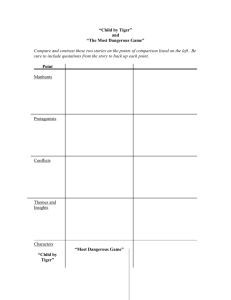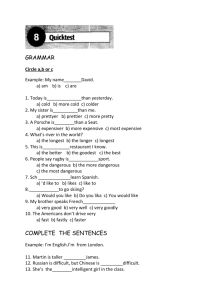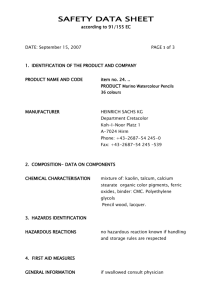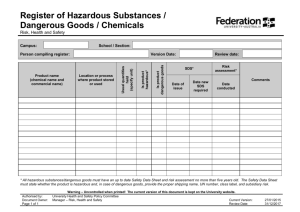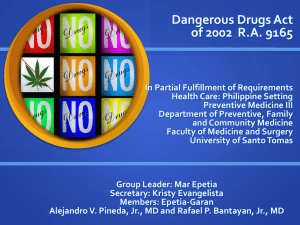THE COMPREHENSIVE DANGEROUS DRUGS ACT OF 2002
advertisement
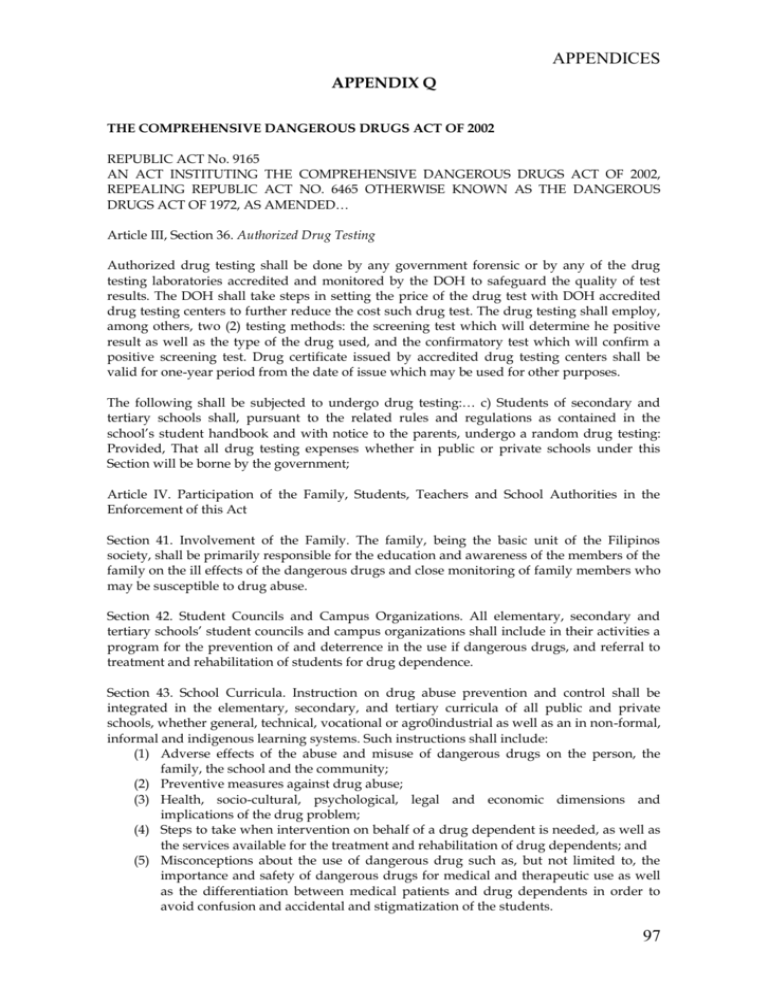
APPENDICES APPENDIX Q THE COMPREHENSIVE DANGEROUS DRUGS ACT OF 2002 REPUBLIC ACT No. 9165 AN ACT INSTITUTING THE COMPREHENSIVE DANGEROUS DRUGS ACT OF 2002, REPEALING REPUBLIC ACT NO. 6465 OTHERWISE KNOWN AS THE DANGEROUS DRUGS ACT OF 1972, AS AMENDED… Article III, Section 36. Authorized Drug Testing Authorized drug testing shall be done by any government forensic or by any of the drug testing laboratories accredited and monitored by the DOH to safeguard the quality of test results. The DOH shall take steps in setting the price of the drug test with DOH accredited drug testing centers to further reduce the cost such drug test. The drug testing shall employ, among others, two (2) testing methods: the screening test which will determine he positive result as well as the type of the drug used, and the confirmatory test which will confirm a positive screening test. Drug certificate issued by accredited drug testing centers shall be valid for one-year period from the date of issue which may be used for other purposes. The following shall be subjected to undergo drug testing:… c) Students of secondary and tertiary schools shall, pursuant to the related rules and regulations as contained in the school’s student handbook and with notice to the parents, undergo a random drug testing: Provided, That all drug testing expenses whether in public or private schools under this Section will be borne by the government; Article IV. Participation of the Family, Students, Teachers and School Authorities in the Enforcement of this Act Section 41. Involvement of the Family. The family, being the basic unit of the Filipinos society, shall be primarily responsible for the education and awareness of the members of the family on the ill effects of the dangerous drugs and close monitoring of family members who may be susceptible to drug abuse. Section 42. Student Councils and Campus Organizations. All elementary, secondary and tertiary schools’ student councils and campus organizations shall include in their activities a program for the prevention of and deterrence in the use if dangerous drugs, and referral to treatment and rehabilitation of students for drug dependence. Section 43. School Curricula. Instruction on drug abuse prevention and control shall be integrated in the elementary, secondary, and tertiary curricula of all public and private schools, whether general, technical, vocational or agro0industrial as well as an in non-formal, informal and indigenous learning systems. Such instructions shall include: (1) Adverse effects of the abuse and misuse of dangerous drugs on the person, the family, the school and the community; (2) Preventive measures against drug abuse; (3) Health, socio-cultural, psychological, legal and economic dimensions and implications of the drug problem; (4) Steps to take when intervention on behalf of a drug dependent is needed, as well as the services available for the treatment and rehabilitation of drug dependents; and (5) Misconceptions about the use of dangerous drug such as, but not limited to, the importance and safety of dangerous drugs for medical and therapeutic use as well as the differentiation between medical patients and drug dependents in order to avoid confusion and accidental and stigmatization of the students. 97 Section 44. Heads, Supervisors, and Teachers of Schools. For the purpose of enforcing the provisions of Article II of this Act, all school heads, supervisors and teachers shall be deemed persons in authority and, as such, are hereby empowered to apprehend, arrest or cause the apprehension or arrest of any person who shall violate any of the said provisions, pursuant to Section 5, Rule113 of the Rules of Court. They shall be deemed persons in authority if they are in the school or within its immediate vicinity, or even beyond such immediate vicinity if they are in attendance at any school or class function in their official capacity as school heads, supervisors, and teachers. Any teacher or school employee, who discovers or finds that any person in the school or within its immediate vicinity is liable for violating any of said provisions, shall have the duty to report the same to the school head or immediate superior who shall, in turn, report the matter to the proper authorities. Failure to do so in either case, within a reasonable period from the time of discovery of the violation shall, after due hearing, constitute sufficient cause for disciplinary action by the school authorities. 98
